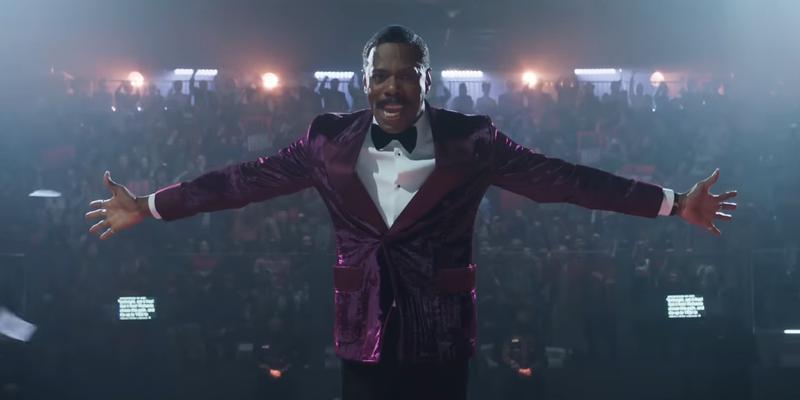
It's a Stephen King world, and we're just... doing deadly cardio in it. The Running Man, the latest King adaptation in a stacked year and the newest film from Edgar Wright, finally galavanted into theaters. King's 1982 novel of the same name is set in a dystopian America in 2025. The economy has tanked, and some people survive by participating in a game show where they're on the run from assassins (Hunters) and the public. If they survive for 30 days, they win a massive prize, but that's a huge if.

The novel, written under the pseudonym Richard Bachman (as was his earlier dystopian cardio tale, The Long Walk), was first adapted in 1987. Starring Arnold Schwarzenegger (you know, the famously svelte actor known for his runner's body type), it received mixed reviews but has since secured a sizable cult following.
Edgar Wright is one of our most talented genre filmmakers, with all three films of the Cornetto Trilogy (Shaun of the Dead, Hot Fuzz, and The World's End) and Scott Pilgrim vs. the World alone being magnificent genre exemplars. Despite some exceptional moments and performances, Paramount Pictures'The Running Man falls short of achieving that level of success.
The Running Man Has a Talented, Wildly Charismatic Cast
In a severely unequal America, Ben Richards (Glen Powell) is effectively blacklisted from various occupations for supposed insubordination (read: he simply likes unions and workers' rights). With his daughter ill, Ben joins the deadly The Running Man game show, hoping to survive for 30 days. The show's producer, Dan Killian (Josh Brolin), and host Bobby T. (Colman Domingo) like his angry moxie, encouraging his public ascent, but can he survive?

The casting choices in The Running Man are excellent. At face value, Powell's movie-star good looks might not be a perfect fit for a down-and-out working man, but he effectively conveys authenticity and raw rage, making him a great protagonist. The central players all excel, with Domingo bringing a predatory charisma as Bobby T. and Brolin capably becoming a truly predatory (yet somewhat vapid) producer.
Some of the film's most striking players find ways to thrive in smaller roles. Lee Pace's hunter Evan McCone is allowed few lines, but Pace is memorable in every one. Katy O'Brian's Laughlin is routinely interesting, and Michael Cera's too-brief segment steals the film. They're all underutilized, unfortunately, but a talented host of players still ground many scenes in novel, often engaging ways.
Some of these performers get excellent showcases of their relative talents. Cera has proven a master at stealing the show with limited screen time (Barbie, anyone? #JusticeForAllan), but he brings a bit of personality and the film's most interesting moments to his short screen time. Ben's unique blend of bombastic TV diatribes and face-smashing anger makes great use of Powell's range, while O'Brian gets barely any screen time at a certain point but is unforgettable in every second.
The Running Man Doesn't Cohere Into a Singular, Successful Vision
The Running Man largely captures the tone of a bombastic, corporate-controlled consumerist dystopia. It's properly reminiscent of ancient Rome's efforts to distract the 'Roman mob,' the famed 'bread and circuses' strategy, and is so conscious of that score that Rome and the gladiatorial arena are explicitly mentioned. The propagandistic element of the world is well-translated through the company's real-time manipulations of Ben's likeness (a relatable concern in today's world).

There's a lot that The Running Man does right. That said, the film's tone is messy. It's an action movie at times, a political thriller in others, and a drama at other moments. Some moments are an odd amalgamation of all three. In the moments where it slows down, you'd think there'd be some constant tension as Ben attempts to hide and sneak without being, you know, discovered and publicly murdered... but there isn't! It's almost inexplicable how little tension there is.
The film does a great job establishing that Ben's a good man with conviction, but the elements that cement that aren't reflected in the majority of the subsequent picture. He's a good man; ergo, he has employment issues, but you only see his personal frustrations for most of the film. He resists being something more for quite some time, but we don't see him wrestle with it much. When he finally decides to represent something, it lands with a 'screw it' energy at odds with the vibe of the finale. Ben's character arc reads like there was indecision as to how to write his character exactly, as if he's caught between two script drafts that haven't been integrated.
While Wright's films (read about his past relationship with Marvel Studios) are usually tightly edited and extraordinarily paced, that's not true here. There's an odd flow between the action-driven moments and the rest, and the film feels like 110 minutes of movie in a 133-minute coat. The ending, changed from King's original, is surely cathartic, but it resolves too easily and fails to make proper sense given its context.
Altogether, The Running Man has its fun moments. Powell is great, with a powerful and high-octane performance (someone please cast him as Achilles) that's charismatic enough to sidestep much of the character's inconsistencies.
The central players burst with charm, and several good set pieces make for gratifying moments. That said, whole segments are plagued by tonal chaos, pacing issues, and brief narrative threads that don't quite work. It's a promising picture in dire need of a director's cut.
Final Rating: 6/10
The Running Man debuts in theaters on November 14, 2025.









